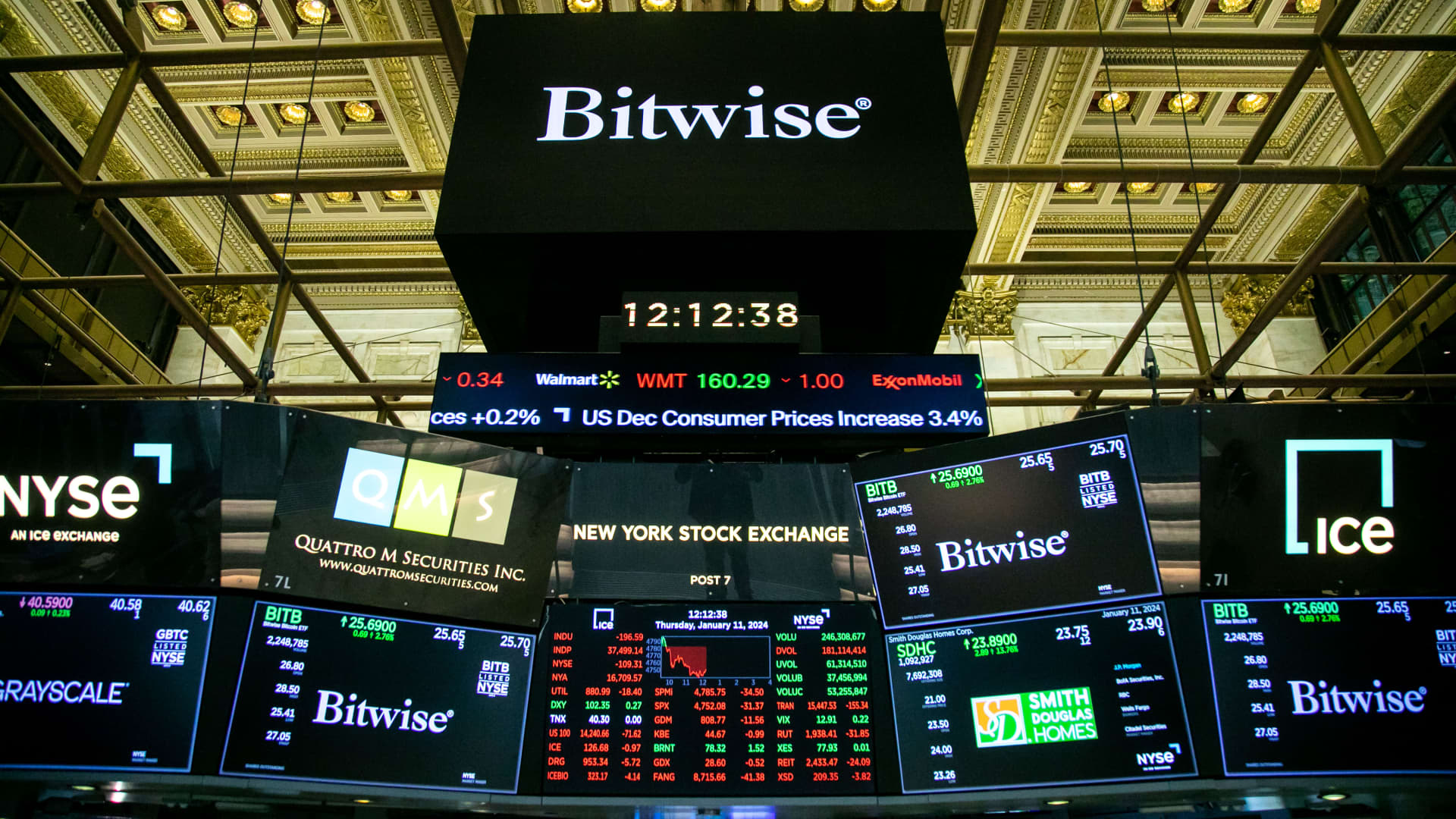The BITCOIN ETF (BITB) signaling of Bitwise Spot at the New York Stock Exchange (NYSE) in New York, USA, on Thursday, January 11, 2024, with the negotiation from the first American stock market funds that directly invest in the largest cryptocurrency.
Bloomberg | Bloomberg | Pictures of getty
If Larry Fink’s vision – CEO of BlackThe biggest money manager in the world: It becomes a reality, all the assets of the shares to the obligations to real estate and could be negotiated online in a chain of blocks.
« All assets, can be token, » Fink wrote in his recent Annual letter to the investors.
Unlike traditional paper certificates that mean financial property, the sheets are safely live in a block of blocks, allowing to buy, sell and transfer instantings without procedures or wait, « as a digital work, » he wrote.
Fink says it would be nothing of « revolution » to invest. Consider the 24 -hour markets and a negotiation settlement process that can be compacted in seconds of a process that can still take days today, with billions of dollars immediately reinverted in the economy.
But there is a great problem, a technological challenge that is on the way: the lack of a coordinated digital identity verification system.
Although technology experts say that Fink’s idea is not unlikely, they agree that there are cybersecurity challenges to work.
Verification of assets owners in the world of fake fake
Today, it is not easy to verify online that the person you interact with is this person due to the prevalence of Ai Deepfakes and sophisticated cyberdeliners, according to Christina Hulka, executive director of the Secure Technology Alliance, an organization focused on identity, access and payments. As a result, having a unified verification system would be useful because there would be a cryptographic validation that people say they are.
« The industry (financial services) is focused on the way to create a zero trust framework for identification. Don’t trust anything until it is verified, » Hulka said. « The challenge is to gather everyone about what technology should be used to make it simple and perfect for the consumer as possible, » he added.
It is difficult to say precisely how a broad digital verification system would work, but to support a completely tokenized financial structure, a system should meet the strict security requirements, in particular those linked to financial regulations such as the rule of your client and the anti-Blacking rules of money, according to Zulfikar Ramzan, a technology officer of Point Wild, a cyber.
At the same time, the system should be of friction and fast. Today there is no shortage of technical tools, especially from the field of cryptography, which can effectively unite a digital identity to a transaction, said Ramzan. « Fifteen to 20 years ago, this conversation would have been a start, » he added.
According to Ramzan, there have been some successes with programs like this worldwide. The Aadhaar System of India is an example of a national digital identity framework. It allows the majority of the population to authenticate transactions through mobile devices and is integrated into both public and private services. Estonia has an ID system that allows citizens to do everything, from banking to online voting. Singapore and United Arab Emirates have also implemented strong national identity programs related to mobile infrastructure and digital services. « Although these systems differ in the way they treat problems such as privacy, they all share a key feature: the leadership of the centralized government that promoted standardization and adoption, » said Ramzan.
Centralized personal data is a great goal for cybercrime
Although a centralized system solves a challenge, the storage of information and biometric data personally identifies is a security risk, David Mattei, a strategic consultant in the practice of frauds and AML at Datos Insights, who works with financial service companies, insurance and retail technologies.
Above all, there have been reports of stolen data in the Aadhaar system of India. And last year, the Government of El Salvador had the personal data of 80% of its citizens stolen to a centralized citizen identity system and directed by the Government. « Many security experts do not advocate having a centralized security system because it is like the pot at the end of the rainbow that all the scammers are trying to put themselves in the hands, » said Mattei.
In the United States, there is a long -term preference for decentralized identity systems. On mobile devices, facial identifier and fingerprint identifier do not centralize all this data in a place in Apple or Google, but by storing the data in a safe module of each mobile device. « This makes it much more difficult, if not impossible, to make the defrauders steal this data in mass, » said Mattei.
Larry Fink, CEO of Blackrock Inc., in the Berlin Global Dialogue in Berlin, Germany, on Tuesday, October 1, 2024.
Bloomberg | Bloomberg | Pictures of getty
Digital Driver’s licenses offer a precautionary tale
Significant coordinated effort would be needed to present a national identity system used for identity verification.
Identity systems in the United States today are fragmented, said Ramzan, giving the example of state motor vehicle departments. « To move forward, we will need a cohesive national strategy or a way to better coordinate identity at the state and federal levels, » he said.
It is not an easy task. We take, for example, the effort that many states are making to adopt Digital Driver’s licenses. About a quarter of the states, including Utah, Maryland, Virgínia and New York, issue mobile driver’s licenses, according to MDLCONNECTION, online resource of the Secure Technology Alliance. Other states have pilot programs in force, promulgated legislation or study the problem. But this company has been quite ambitious and has been running for several years.
Implementing a national identity verification system would be a « massive company and would require almost all companies that do online businesses to adopt a government standard for identity verification and authentication, » said Mattei.
Competitive forces are another problem to deal with. « There is an ecosystem of sellers that offer identity and authentication verification solutions that would not want a centralized system for fear of leaving the business, » said Mattei.
There are also significant obstacles of data privacy to overcome. The states and the federal government should coordinate to solve governance problems, and this could lead to « Big Brother » concerns about the extent to which the federal government could supervise the activities of its citizens.
Many people have « an allergic reaction » when anything that resembles a national identification, said Ramzan.
Fink has been pressing the dry to look at problem
The idea is not a new for Fink. To Davos earlier this year, Told CNBC that he wanted the dry « To quickly expand the tokenization of stocks and good ones. »
There is a Blackrock’s own interest and a potential cost savings for the firm and for many others, which Fink spoke. In recent years, Blackrock has been dragged into political battles and demands, due to a massive amount of actions that are in its funds on ESC issues. « We should no longer vote on a vote of representation, » Fink told CNBC to Davos, referring to « the Blackrock tax. »
« Each owner would be notified of a vote, » he said, adding that it would reduce the cost of ownership of shares and obligations.
It follows from Fink’s decision to give this topic a prominent location in his annual letter, even if he was third in the order of questions he dealt with behind both the policy of protectionism and the Growing paper of private markets – Don’t let go. And what is needed to come true, according to him, is a new digital identity verification system. The letter is short of details and Blackrock refused to make, at least on the surface, the solution for Fink is clear. « If we are serious to build an efficient and accessible financial system, the tokenization promotion is not enough. We must also solve digital verification, » he wrote.
Blockchain continues to evolve and people are learning to understand -better. Consequently, there are initiatives underway to think about how the United States can achieve a broad identity verification system, Hulka said. There are technical ways to do it, but finding the correct way that works for the country is another challenge that must be interoperable. « The goal is to reach a point where there is a way to verify identity between various services, » he said.
Finally, there will be a point of view for the financial services industry where it becomes a business imperative, Hulka said. « The question is when of course. »
















Leave a Reply